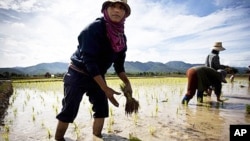The Thailand government is expected to begin soon a major new pricing scheme for rice that could have a big impact on the world’s biggest rice exporter. Analysts say the higher prices paid to farmers will mean a decline in Thai rice exports, opening opportunities to rival exporters, such as India and Vietnam.
The rice pricing scheme was a key policy promise by the Pheu Thai Party of Prime Minister Yingluck Shinawatra to secure the support of the country’s eight million rice farmers in the July general elections.
According to the plan, the government will pay almost $500 per metric ton for white rice and $650 for higher quality fragrant rice. That is about a 50 percent increase from the previous government’s policy guaranteeing farmers $330 per metric ton. Agriculture officials say four million rice farmers have registered for the new scheme.
David Dawe, a UN Food and Agriculture Organization (FAO) economist, says while the higher price may lead to more rice production in the longer term, there remains uncertainty over the program's full impact. "There are a lot of uncertainties as to exactly how this is going to work right now; which is why there is a mixed effect on world prices. I mean, the government doesn't have the capacity, I don't think, to procure the whole crop by them. They're going to have to work through the private sector. This is going to be an interesting question because they're not going to want to buy at that price if it forces them to sell at a loss on the export market," he said.
This year, Thailand's rice production is expected to exceed 20 million metric tons, with about half of the total destined for export. Similar sized exports were initially forecast for 2012, but the U.S. Department of Agriculture now forecasts that number will fall to seven million metric tons under the new scheme.
Thailand has been the world’s top rice exporter since 1981. The country’s key competitors are India and Vietnam. India is the world’s second largest rice producer and recently returned to the global rice export market by lifting a 2008 ban on exports of common grades of rice. Other rice exporters, such as Brazil and Pakistan, are also expected to see increased global sales.
Samarendu Mohanty, an economist with the Philippine-based International Rice Research Institute (IRRI), says the Thai government will need to subsidize export rice prices to compete with other countries on the global market. He says that will affect Thai taxpayers.
"There will be an export subsidy. So the program in place for the Thai government to sell its rice either government to government - or export licensing - I would expect the global price to be going down - the debilitating effect of the Thai program on the global market. The only thing is it will cost the Thai taxpayer quite a bit of money and Thai rice will be more expensive on the domestic market. The Thai program will be subsidizing the rest of the world consumers," he said.
Ammar Siamwalla, president of the private sector think tank, Thailand Development Research Institute (TDRI), says the main beneficiaries will be larger rice producers. He fears the program will likely result in the creation of a state-run national rice corporation, which will hurt Thailand's private rice export sector. "The big thing is, it's going to destroy our private rice industry particularly from the mills onwards. We are 50 per cent higher than the market right - how are we going to sell it - and therein lies the answer to your question - is the government taking over the rice trade," he said.
Ammar says the government’s program may also be susceptible to corruption and budget shortfalls.
A similar program in 2008 suffered from a budget shortfall of more $1.4 billion. The USDA has warned that if the Thai government uses government subsidies to export rice at prices below what it pays Thai farmers, it may be violating World Trade Organization rules.
Thailand Rice Pricing Plan Creates Global Uncertainty
- By Ron Corben




